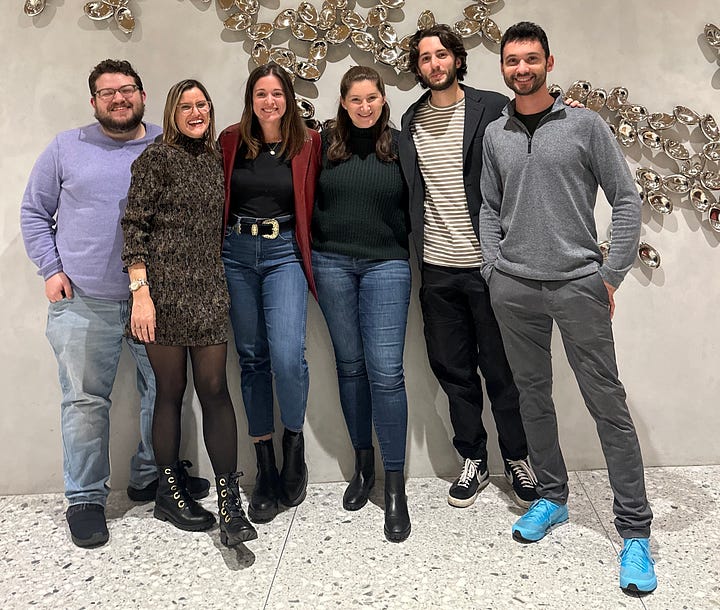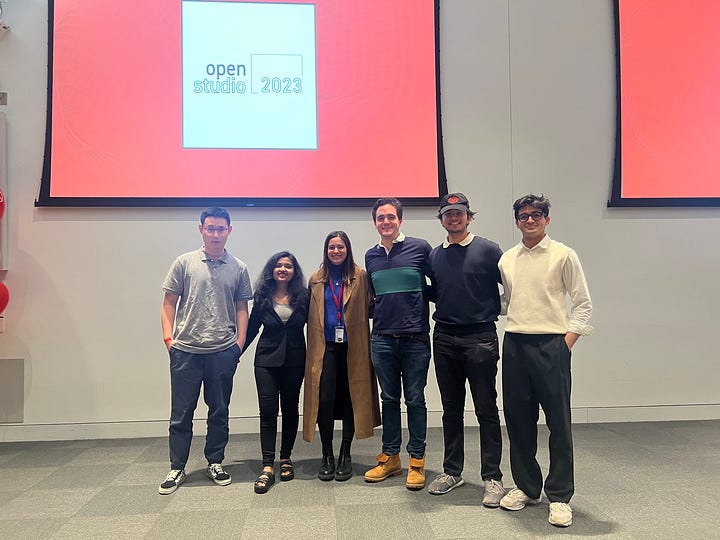
When I left my corporate job in May, I set out to experiment with what to do next in my career. No sooner than setting a goal to experiment with teaching did a role at Cornell Tech pop up on LinkedIn for a Studio Coach. The role was an untraditional mix of teaching + coaching in their Product Studio course.
Product Studio is a mandatory course for all graduate students passing through Cornell Tech. Students are assigned to teams, given company advisors and meant to solve real business problems throughout the semester. As a Studio Coach, I was hands-on in the classroom, teaching content, holding office hours and grading projects.
Last week, students presented their final projects to determine if their business ventures were viable (see a student project here). And with the final projects also came the conclusion of my teaching experiment.
So, how’d it go?
This experiment was a lot of things: exhilarating and inspiring but also frustrating and challenging in new ways. More than anything, it was incredibly fulfilling.
Retrospecting a semester teaching
I learned a lot of new things….
How the corporate world is wildly different than academia
I had no idea what to expect moving from the corporate world into academia but, boy, was it a transition. From a new incentive structure to unfamiliar day-to-day operations, learning how to get things done in a school setting was a major adjustment. In some ways, academia is a service business, and in some ways I was a service worker ensuring that my customers, my students, were learning and growing throughout the semester (which of course, was not completely in my control).
Watching a generation, one that experienced college through a pandemic, navigate school and its related challenges with new technology was more fascinating than anything else. New tech enables new norms: writing assignments with ChatGPT assistance, getting immediate feedback from me over slack. Some of these norms are totally different from when I went to school and drastically inform the expectations students have of their experience. New tech, new circumstances and of course a new generation makes the academic experience look quite different from mine. And of course, quite different than a corporate environment.
How to let go of what I can’t control
As a recovering people pleaser, I have a history of striving to make others happy. As I’ve grown, I’ve learned that people-pleasing is an unsustainable and often self-destructive way to live. That reality was quickly illuminated when I began coaching 140 students. With a group of that size, even a small percentage of dissenters could easily wear down a people-pleaser like me. So I sought to provide the students with constructive feedback, make myself available to those interested in learning, and cede power over to the things I couldn’t control. With a huge workload at school and a coaching business to run, boundary setting was crucial to my success and my sanity.
How to better pivot on the fly
Each week, I taught two back to back classes. Each class, I led 70 students through lesson plans, activities and assignments that were prepared for me, which I put my finishing touches on hours earlier in the day. No matter how many times I explained something, I was always fielding questions from students about what we were doing, why we were doing it and in the worst cases, complaints about the course. It wasn’t easy.
In between classes, I had a 10-minute “break” to regroup, turn over the room, go to the bathroom and answer more questions. Most challenging of all was having to quickly adapt between the two classes. What activities went well, what content should I skip, what questions to anticipate. Through this experience, I honed my ability to read the room (i.e., when were students engaged and when did they zone out). And because of this, my second section likely benefited from this setup (sorry, section 1).
Over time, I learned what type of material resonated with most students and the rhythms that maximized overall engagement. After spending 4+ years predominantly on zoom, I dusted off my improv and presentation skills 2x a week, stood in front of 140 students, and taught a curriculum that wasn’t my own. With a mic in my hand, I balanced speaking slowly to many international students while bringing levity to the room with humor. So basically, I’m ready for my Netflix special.
And was reminded of a lot of things I knew…
I love to lead
From a young age, I’ve loved to lead. From teaching “school” to my younger sister in our basement to teaching dance to young girls at various points of my life, I’ve always loved being a leader. It’s intrinsic to who I am. Mobilizing people around a common goal energizes me. And, long after I accepted this role, I realized how perfect this opportunity was for me to exercise my leadership qualities in a new setting. It may be why coaching feels so great. And, it may be why product management was a natural fit as a career path. Teaching at Cornell Tech was the perfect reminder of what I enjoy most: Helping others realize their potential. In some ways, it felt like a homecoming.
One size fits all makes few people happy
Product managers are trained to have a narrow customer focus and build for their needs, not build for all potential customers. Teaching - in whatever setting - goes against this principle. Graduate programs can be better, but any large, mandatory class will face challenges of a one size fits all model. Product Studio was a perfect demonstration of this conundrum. Along with not taking things too seriously, I did my best to combat student frustrations by providing extensive 1:1 time to make sure they felt heard. It got me thinking about education as a whole and how much improvement there could be if educators, like product managers, were given the space to segment and build for students' needs. I absolutely get why this doesn’t happen today, but imagine a world where bits of it could.
The people you work with matter. A lot.
I landed on a team of dedicated, hard working, compassionate faculty at Cornell Tech. After years of working remotely, I savored seeing my coworkers twice a week and lingering over long lunches in the faculty kitchen, discussing the latest T Swift news. To my coaches and the Product Studio team, thank you for bringing me into the fold with welcoming arms. I felt at home right away. To my students, thank you for giving me a chance, trusting me and making me laugh. I hope you had as much fun as I did.


It's never too late to try something new
A year ago, I couldn’t have imagined I’d be here. The thought of leaving a coveted product position in big tech felt impossible and irresponsible. I’m here to tell you, nothing is impossible or unimaginable. The choice to step away and do something completely out of my comfort zone was a salient reminder that throwing yourself into something new is one of the quickest ways to gain perspective and grow. I’ll hesitate a lot less in the future to try new things - to put myself in new spaces, to interact with new faces, and confront new challenges. And I encourage anyone struggling in work or life to do the same!
What’s next for me?
While I'm doubling down on building out my coaching business in the new year, I’m also thrilled to stay on at Cornell Tech for the spring semester to teach a product management elective. Creating my own curriculum and working with a smaller cohort of students, I hope to bring my real world product experience to the classroom to expose students to the field I fell into and fell in love with. Roosevelt Island, I’ll see you in 2024. 🏝️
Edited with the help of Todd, my personal and prolific editor, who, as with many things, weathered the ups and downs of the semester with me. ❤️

